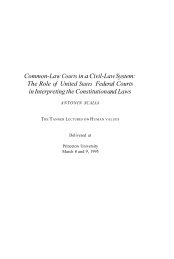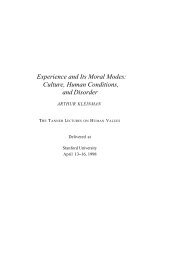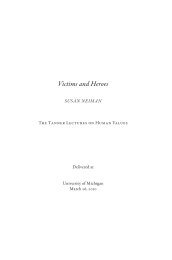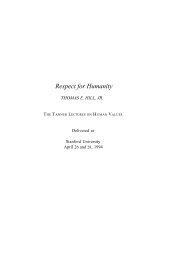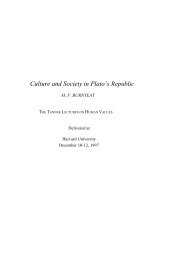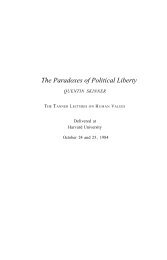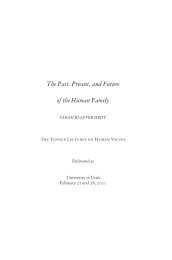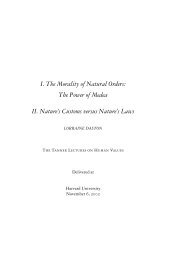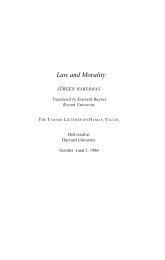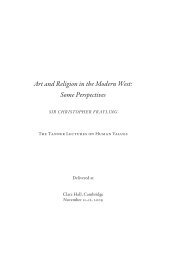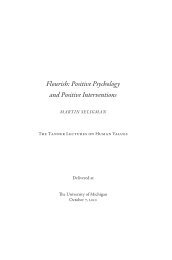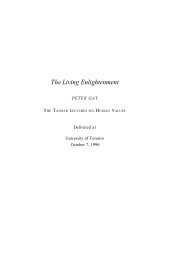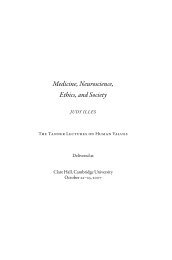Muguerza, Javier - The Tanner Lectures on Human Values
Muguerza, Javier - The Tanner Lectures on Human Values
Muguerza, Javier - The Tanner Lectures on Human Values
You also want an ePaper? Increase the reach of your titles
YUMPU automatically turns print PDFs into web optimized ePapers that Google loves.
102 <str<strong>on</strong>g>The</str<strong>on</strong>g> <str<strong>on</strong>g>Tanner</str<strong>on</strong>g> <str<strong>on</strong>g>Lectures</str<strong>on</strong>g> <strong>on</strong> <strong>Human</strong> <strong>Values</strong>supposedly would corresp<strong>on</strong>d to a moral or noumenal politicalworld (res publica noumen<strong>on</strong>)-principles derived from, anddependent up<strong>on</strong>, imperatives (moral imperatives) of reas<strong>on</strong>(practical reas<strong>on</strong>). But according to this metaphysical doctrineof the two worlds or “two kingdoms (Zwei-Reiche-Lehre),” bothlaw and politics would in fact lose their positivity, thereby threatening,still according to Habermas, to destroy the very viabilityof the distincti<strong>on</strong> we spoke of before between legality (of a positivelaw within an also positive c<strong>on</strong>cepti<strong>on</strong> of politics) andmorality.Be that as it may, the dynamics of modern social life seemsto flow through quite different channels from those foreseen, ordreamed of, in Kantian ethics. And the dogmatics of private law,as well as of public law, would c<strong>on</strong>tradict Kant’s juridical c<strong>on</strong>struct,according to which positive politics and positive law wouldhave to be subordinate to the moral imperatives of rati<strong>on</strong>al law.Now, if <strong>on</strong> the <strong>on</strong>e hand, the moral foundati<strong>on</strong>s of positive lawcould no l<strong>on</strong>ger be modeled <strong>on</strong> a Kantian subordinati<strong>on</strong> to rati<strong>on</strong>allaw, <strong>on</strong> the other hand it is also clearly impossible to deal with,or avoid either, without first having found a substitute for rati<strong>on</strong>allaw itself. Habermas quotes the dictum of the German juristG. F. Puchta, who in the last century proclaimed that the creati<strong>on</strong>of law could not be exclusively the work of political legislators,since in that case the state could not be founded <strong>on</strong> law, that is,not be a state of law, where “state of law” is offered precisely asa substitute for rati<strong>on</strong>al law. 52But, in additi<strong>on</strong> to the questi<strong>on</strong> ofstrict legality, the idea of a state of law poses the problem of“legitimacy,” unless <strong>on</strong>e wants to interpret in strictly positivisticterms a no less famous dictum, which another jurist, H. Heller,quoted during the Weimar Republic: “In a state of law the lawsare the totality of the juridical norms promulgated by the Parlia-52 Ibid., 8ff.



